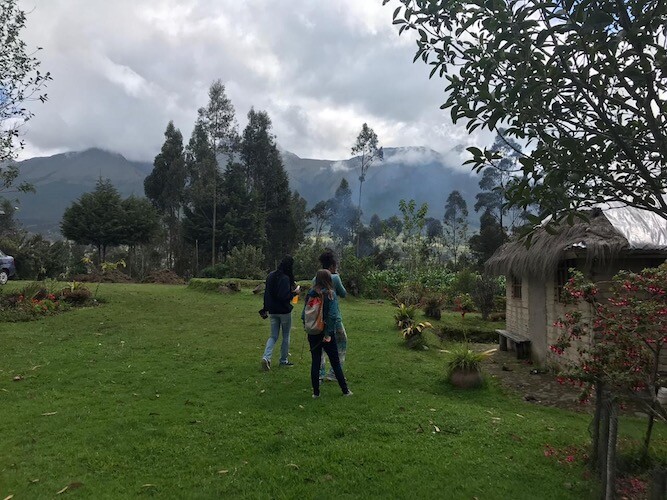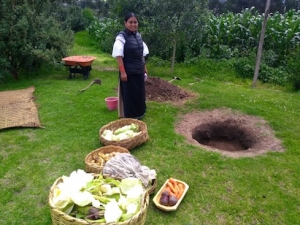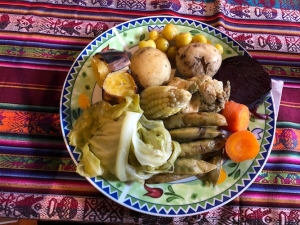
The following post was written by Global Gap Year Fellow Taylor Molina. Taylor is spending her gap year in Ecuador with Global Citizen Year.
Regional cohorts often reconnect to talk about their experiences in Ecuador while experiencing something new. One that we decided on in December was to participate in cooking pachamanca. Where we lived in the Imbabura province there is heavy influence from indigenous people. We wanted to learn more and experience traditions from a tribe that lives close to us all in Otavalo.
When we showed up we were astonished by how beautiful their piece of land is. You could see the volcano so close by and their dogs were running around happily. We knew we would be cooking food but were not given much information besides that, and were staring at the big holes in the ground. Nearby the holes there were stones and also a huge pile of dirt. Piecing together what the ceremony would be we started talking to the women there and they laughed at the Kichwa words we knew. Kichwa is the indigenous language and some Kichwa words are commonly said by Spanish speakers where we lived. We all use the Kichwa word for pig and we all know how to say it is cold.

After our introductions, we were led by a man who first explained to us how important the earth is in his culture. He explained how much the land gives us and how we need to give back and thank the land we live on. It is important to recognize and give thanks to the land and this ceremony is to be thankful for the earth. After his explanation in Spanish, so we could understand, he sang to the Earth and the land in Kichwa.
When he was done singing and playing music, for now, he explained what we needed to do with what he put in our hands. He said that we needed to blow air into what he gave us with intention. We needed to put our energy into our hands and then place what we had into the hot stones behind us. The point of this was so that our energy would be connected to what we were cooking and doing.
With this part done, he asked the women to bring out all the food. We observed all the fresh food we would be eating in separate bowls around us. Different types of potatoes, corn, platanos, beets, and something they said was a surprise wrapped in husks. Looking at the food we were all so excited. But before we could eat it, we needed to set everything up to cook. The earth was going to cook our entire meal for us.
To begin, we were shown how to take the stones from the pile and move them to where they could be whacked with the leaves in order to be cleaned. After, we would place them in the hole to cover the entire bottom ground. All of us took turns doing this and it was more complicated than it seemed. While there was no fire, it was so insanely hot once you got near it, it felt like you were the one cooking while you were picking up the rocks. Picking them up was difficult to get them on the rake and not fall off plus, they were heavy!
Now, it was time to put the food in. They placed all the food around the hole as we watched in awe. None of us had experienced cooking like this and we were all taking it in. With the food finally inside, we then put the tarp on top and then shoveled dirt on top of that. This was like putting the lid on a pot. He then explained that to seal it we needed to all walk around and with one foot stomp on the rim of the circle. We did this while they sang and once we caught on we could get a word in the song too. He said that in doing this we were putting ourselves and our energies into the food. From our energy we were flavoring the food and with different people the food can taste differently.

Once it was fully sealed they dumped hot water over it and steam went everywhere. It was such a beautiful ceremony and what made it even a little more wonderful was that we got to eat the product at the end of it! The ceremony was such a good reminder to be kind to the land we live on and to be more appreciative. It was nice to be able to experience their kind words, beautiful singing, breathtaking land, and delicious food. Some of my friends even said it was the best meal they had in all of Ecuador. Plus, the special surprise that they had wrapped up was chicken which we all thought was a great surprise. I recommend doing this ceremony if you go to Ecuador because it is such a fun and immersive way to learn about a different culture and the people around you.
